By Paige Watts, Epicure & Culture contributor. This post on eco-friendly Atlanta contains affiliate links to trusted partners.
Atlanta, Georgia is one of the hottest destinations in the South.
This bustling city is known for its southern charm, culinary delights, vibrant local art scene, and rich history.
It’s also a city that’s easy to fall in love with, especially when you see the strides local businesses have taken to go green.
For the conscious traveler wanting to explore Georgia’s capital city, here is a guide to eco-friendly Atlanta.
Visiting #Atlanta? Here is how to explore the city sustainably, including ethical experiences, restaurants & hotels! #SustainableTourismThings To Do: Responsible Tourism In Atlanta

Shop Local Indie Craft Markets
No Georgia travel guide would be complete without discussing local artisans and businesses!
Atlanta’s Indie Craft Experience hosts numerous craft events throughout the year, from seasonal indie craft fairs to workshops and beyond.
Their mission is to provide opportunities to local makers and sellers, while also educating shoppers on the value of shopping directly with producers to cut out the middleman.
When visiting one of their indie markets, you’ll not only get to shop vintage jewelry, handmade garments, beautifully-crafted housewares, and creative art, but DJ Zano keeps the energy up while local food vendors ensure shoppers can taste the local flavors.

Bike Off The Beaten Path
On a Fall In Love With Atlanta Bicycle Tour, you’ll explore the city beyond the typical tourist sites to gain a local perspective.
This active experience introduces you to a range of local sites, from a beautiful Victorian cemetery to an outdoor street art hub to historic neighborhoods lined with Queen Anne Victorian homes and more.
The tour ends at the MLK Jr. National Historic site in Atlanta’s Sweet Auburn Historic District.
Bonus:
Along with immersing yourself in Atlanta history and culture, you’ll also be limiting your carbon footprint.
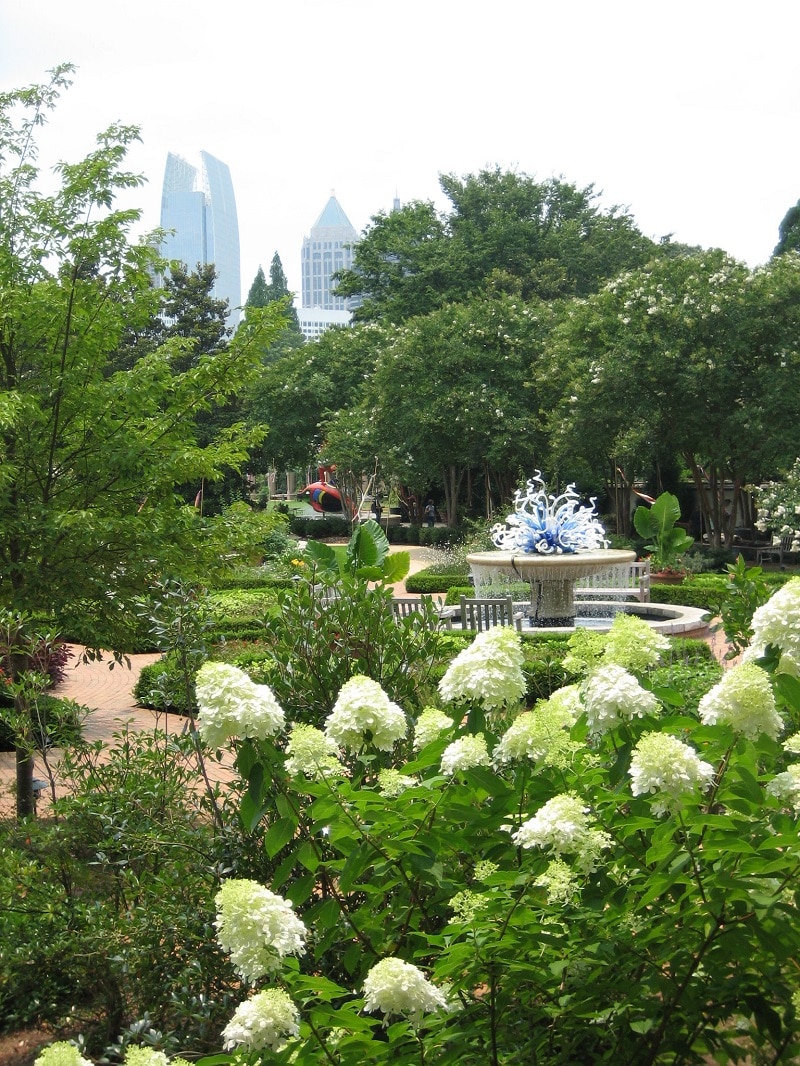
Roam The Atlanta Botanical Garden
The Atlanta Botanical Garden covers an impressive 30 acres of themed gardens highlighting a variety of plants.
A few of the many highlights here include the tranquil Japanese garden, the 10-acre Storza Woods, the Garden Dorothy Chapman Fuqua Conservatory of tropical rainforest and desert plants, and the Fuqua Orchid Center — home to the largest collection of orchid species on permanent display in the United States.
Passionate about #EthicalTravel? Check out this in-depth guide to responsible #AtlantaTravel! Any sites, restaurants, or hotels we should add to the list?In terms of eco-friendly Atlanta, the Botanical Garden has a number of sustainable features throughout.
For instance, during their Green Expansion Plan that doubled the size of the Garden, they recycled all trees removed as a result of construction and employed energy-saving strategies.
In 2007, the Garden installed a 100,000-gallon cistern underground to aid in water conservation; rainwater collected in the cistern now waters about 40% of the gardens.
Moreover, the visitor center is 50% covered by plants, providing natural cooling, sound insulation, and additional garden area.
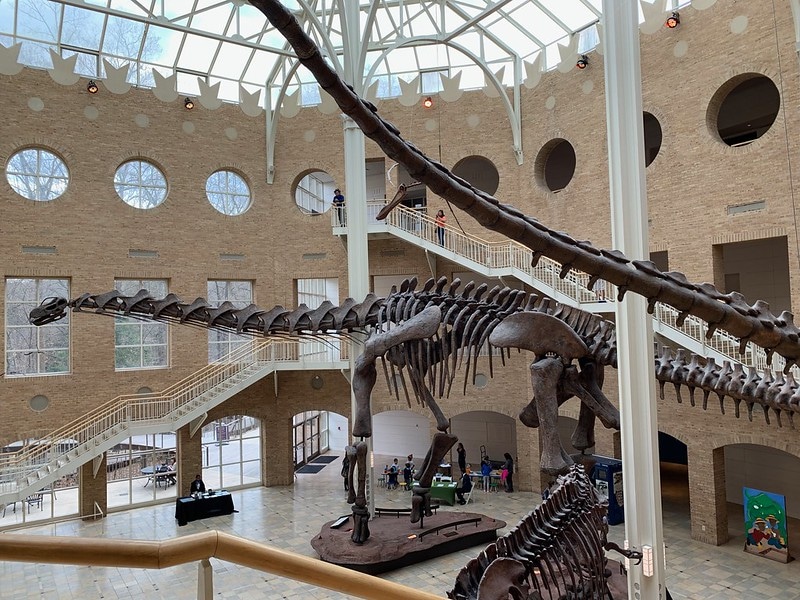
Explore Atlanta Heritage & Culture At The Fernbank Museum Of Natural History
The Fernbank Museum of Natural History is full of dinosaurs, culture, and hands-on science experiments that are fun for both children and adults.
Its permanent exhibits are all about the natural history of Georgia, and you get the opportunity to walk through the history of the state.
Outdoors, you can explore the WildWoods and Fernbank Forest, which features two miles of hiking paths through an old-growth forest.
Fernbank Museum is one of the oldest conservation non-profit organizations in the United States. The museum’s primary goal is to preserve and protect Fernbank Forest, which they accomplish through their conservation work.
They also implement a number of sustainability practices, including an onsite recycling program and water conservation in its restrooms.
Furthermore, Fernbank educates its visitors on ways to practice sustainability through special programs, exhibits, and IMAX features.
Enjoy The Outdoors Through The Atlanta BeltLine
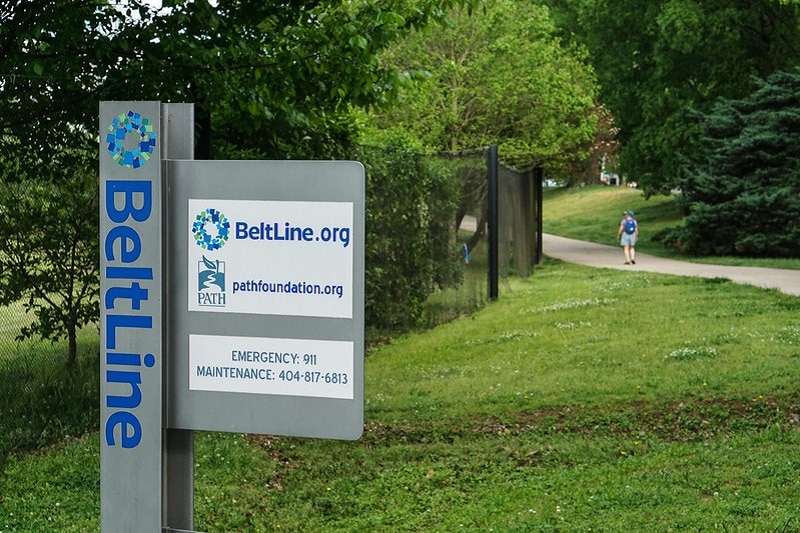
The Atlanta BeltLine is a wide-ranging urban redevelopment program that aims to make Atlanta a global beacon for inclusive and sustainable city life.
This proposed 33-mile loop of paved multi-use trails — of which a third has already been developed — connects parks and communities while providing an inner-city greenspace and alternative methods of getting around.
More than two million people walked, ran, biked, rollerbladed, and scootered the BeltLine trails in 2018, all while enjoying the outdoors and the local public art that lines the trails.
Sustainability is at the core of the Atlanta BeltLine project.
While paving the trails, the project will remove and clean soil contaminated by decades of industrial use as well as create or improve 1,300 acres of parks around the corridor.
The project also includes plans for a streetcar network as an alternative mode of transportation for local residents and tourists to Atlanta.
Where To Stay: Green Hotels In Atlanta
Stonehurst Place Bed & Breakfast – Midtown Atlanta

Stonehurst Place Bed & Breakfast has eight unique rooms and suites in the cozy interior of an 1896 mansion.
Winner of the prestigious EarthCraft Home and Southface 2008 Renovation Project of the Year, this historic mansion has kept its period feel after its eco-friendly transformation.
The B&B features 10 solar thermal panels that heat hot water, in-room recycling, a private potable rainwater system, and a greywater recycling system to conserve water for irrigation of the property’s lush gardens.
Ellis Hotel – Downtown Atlanta
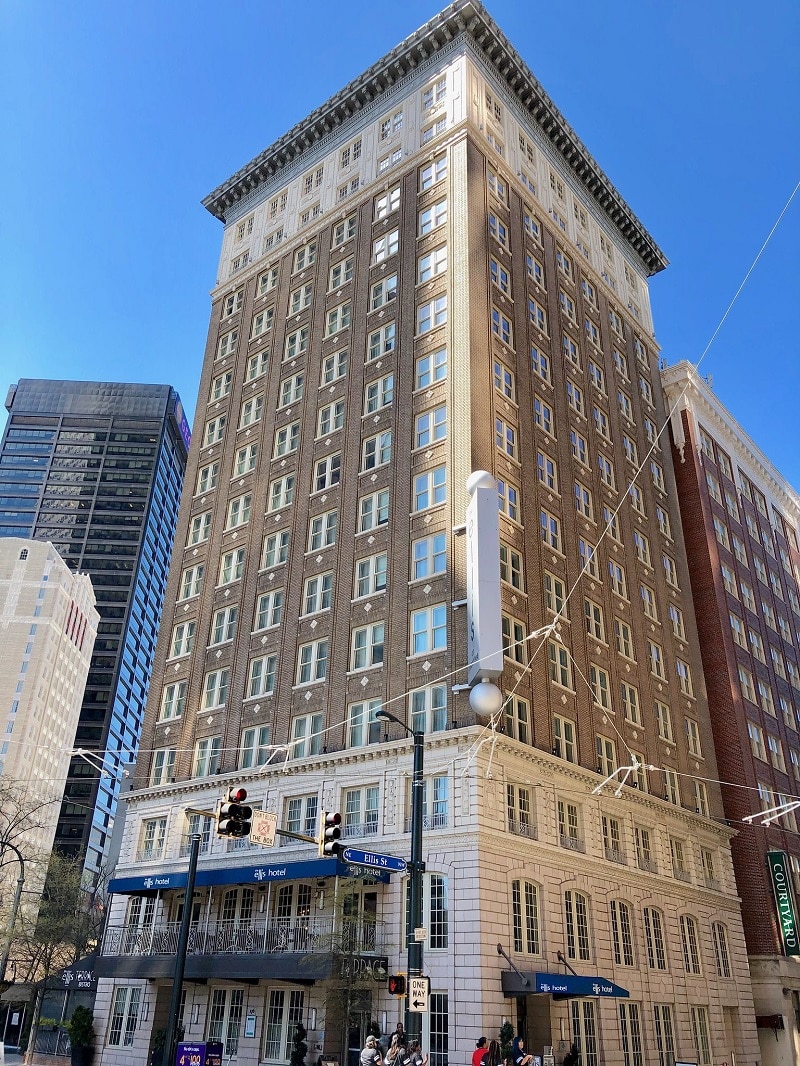
Ellis Hotel in Downtown Atlanta is a chic, eco-friendly boutique hotel located within walking distance from some of Atlanta’s top attractions.
This hotel has been recognized as a Silver Level National Green Seal Property and was the winner of the Division 1 Outstanding Good Earthkeeping Award from the Georgia Hotel & Lodging Association.
The Ellis Hotel earned these accolades for their use of non-toxic, biodegradable housekeeping products, water-efficient landscaping and groundskeeping practices, water-saving fixtures in guestrooms, 100% energy-efficient lighting in guestrooms, and energy-efficient appliances.
The hotel is also a participant in Clean the World’s soap recycling program.
Twelve Hotels Atlanta – Twelve Midtown & Twelve Downtown
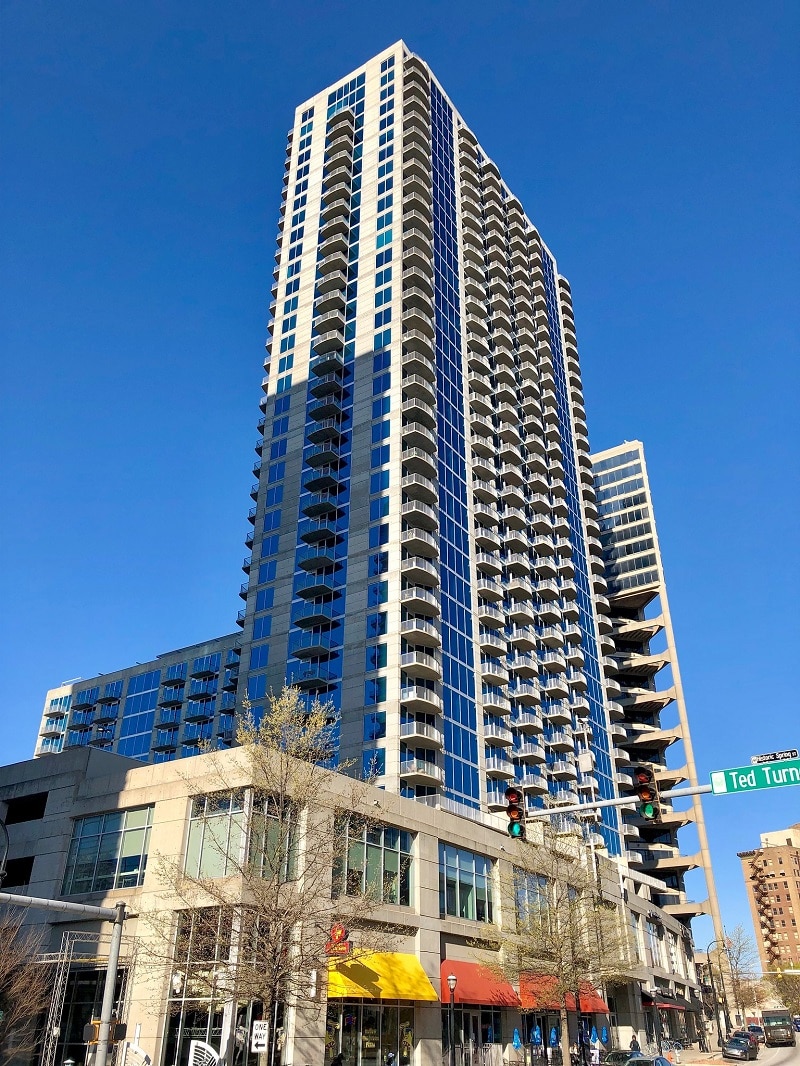
With locations in both Midtown and Downtown, Twelve Hotels by Marriott are stylish, modern hotels with luxury suites and bamboo flooring.
One sustainability practice of Twelve Hotels includes the use of high-end fixtures designed to manage water consumption.
Additionally, all of the cleaning supplies used throughout both the Midtown and Downtown properties are environmentally-friendly, and the provided toiletries are free of sulfates.
In terms of eco-friendly Atlanta, the hotels also recycle cardboard and plastics, restaurant to-go packaging, and even cooking oil that is turned into fuel.
What are your favorite sites, tours, hotels & restaurants for exploring #ResponsibleTourism in #AtlantaGeorgia? Here are @EpicureCulture's picks!Where To Eat: Eco-Friendly & Farm-To-Table Restaurants In Atlanta
True Food Kitchen

True Food Kitchen believes that the food you eat should make you feel better, not worse.
The restaurant sources organic and in-season ingredients to create dishes that are optimal for a healthy body. Their menu has something for everyone, including tasty gluten-free, vegetarian, and vegan dishes.
If you’re looking for a health-conscious meal, you can’t go wrong with this relaxed, eco-friendly chain in Buckhead.
There are so many great dishes to choose from, though a personal favorite is the healthy bowls, like the Ancient Grains bowl made with miso sesame glazed sweet potato, turmeric, charred onion, snow pea, grilled portobello, avocado, and hemp seed.
Pro tip:
Enjoying brunch in Atlanta is a must, and is made even better with a plate of True Food Kitchen’s grilled sustainable salmon served in a cilantro pumpkin seed pesto. Yum!
Herban Fix

Located in Midtown, the pan-Asian eatery Herban Fix offers a fully plant-based menu.
Chef Wendy Chang creates bold vegan variations of classic and well-loved Southeast Asian dishes that are delicious to eat and good for the environment.
Herban Fix is dedicated to a healthy and eco-friendly lifestyle by serving fresh and sustainable, tasty vegan cuisine for Atlanta to enjoy.
Try their gluten-free bibimbap made with assorted vegetables, mountain root, and greens over rice or their classic Herban Fix Fried Rice made with bok choy, shredded vegetables, soy chicken, nuts, and cranberries.
Upbeet

As fast-casual, counter-service eatery, Upbeet has a mission of serving clean, healthy food without sacrificing convenience. Their menu is veggie-forward, providing a haven for vegans and vegetarians alike.
The restaurant’s signature salads and grain bowls are customizable with organic vegetables, grass-fed animal proteins, non-GMO vegan proteins, and housemade dressings made with clean oils.
They also have organic smoothies like the Green Day, made with organic kale, organic spinach, avocado, organic banana, organic cold-pressed apple juice, organic dates, and organic almond milk.
Upbeet furthers its goal of sustainability by composting and recycling nearly everything used in the restaurant, using energy-efficient lighting, and installing water-efficient restroom fixtures.
Visiting #AtlantaGeorgia? Check out @EpicureCulture's ultimate guide to #ResponsibleTourism in the city, including places to go, eat and stay!King Of Pops

King of Pops is in the business of doing good, both for the community and for the environment.
Their flavorful popsicles that you can find all over Atlanta are an ecologically responsible, fresh, and all-natural treat.
King of Pops sources its dairy and in-season fruit from the best local farms, they’ve created their own local compost operation, and they continue to push themselves to do better every single day.
This is a company that is changing the world, one popsicle at a time.
What are your favorite sustainable and eco-friendly Atlanta attractions?
Enjoyed this post on eco-friendly Atlanta? Pin it for later!
 |
 |
 |
More pins! 🙂
 |
 |
Further Exploration:
5 Beautiful Boutique Hotels In The USA
Is Himitsu The Secret To Atlanta’s Burgeoning Cocktail Scene?
11 Amazing Trips Letting You Help Save The Sea Turtles
Latest posts by Paige Watts (see all)
- Eco-Friendly Atlanta: Green Places To Go, Stay & Eat - Apr 21, 2020



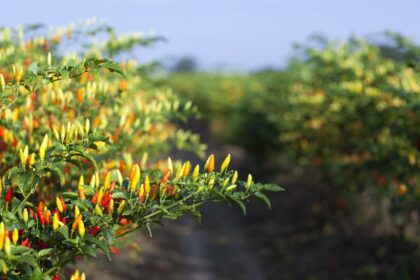

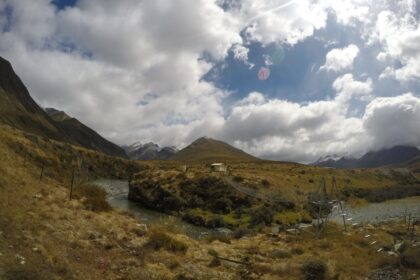
https://babulilm.co.uk/